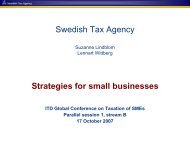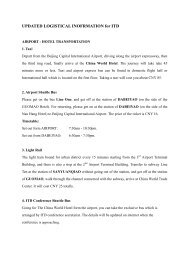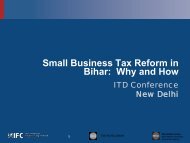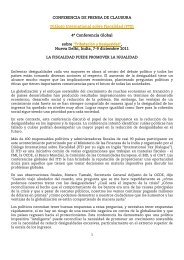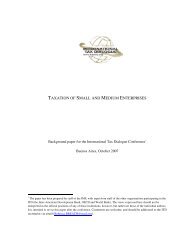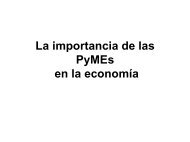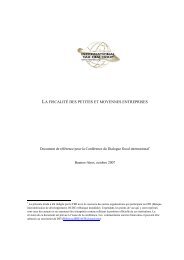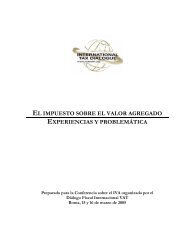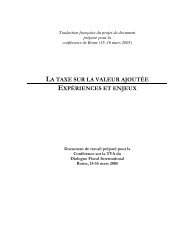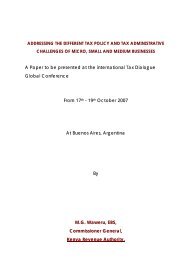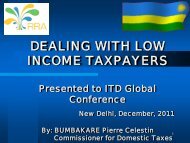Arcotia Hatsidimitris - International Tax Dialogue
Arcotia Hatsidimitris - International Tax Dialogue
Arcotia Hatsidimitris - International Tax Dialogue
You also want an ePaper? Increase the reach of your titles
YUMPU automatically turns print PDFs into web optimized ePapers that Google loves.
76 – 8. TRANSFER PRICING AND DEVELOPING COUNTRIES<br />
achieve this. This will represent a valuable addition to the work of the Global Forum on Transparency and<br />
Exchange of Information for <strong>Tax</strong> Purposes and the Informal Task Force on <strong>Tax</strong> and Development.<br />
In general, developed countries have larger networks of information exchange and double taxation<br />
agreements than developing countries. They are therefore likely to have more experience of negotiating<br />
exchange of information articles in their treaties and tax information exchange agreements. These are skills<br />
which could be shared to good effect with developing countries and should be included in the register<br />
referred to above.<br />
Key thoughts for the chapter<br />
Over the last five years developing countries have grown their awareness of the risk of significant tax<br />
loss through transfer pricing and the importance of developing their skills and expertise to meet this<br />
challenge. Although many multi-national enterprises invest significantly to ensure that transactions which<br />
do not take place in an open market are priced properly, a number do not and there are growing concerns<br />
that the economies of developing countries are disadvantaged by their failure to do so.<br />
Many of the issues faced today by developing countries share common features and have previously<br />
been addressed by others. It follows that the best source of support for developing countries in the context<br />
of transfer pricing lies in closer international collaboration amongst developing countries in comparable<br />
situations and more widely in the international community. This will help tax administrations in<br />
developing countries to improve their transfer pricing skills and knowledge while at the same time<br />
levelling the trading playing field across the globe.<br />
There are two key recommendations to assist this process. First, delivering the register referred to<br />
above. With co-operation from all members of the FTA it should not be too difficult to develop. The FTA<br />
could also help to develop a diagnostic tool that will help developing countries to identify the aspects of<br />
their transfer pricing regime that are priorities for improvement. That will allow them to make more<br />
informed choices between the types of assistance catalogued on the register.<br />
Second, ATAF is already planning a conference on transfer pricing to share knowledge and build<br />
expertise. This should take place in an ATAF member country during 2012. The FTA should work with<br />
ATAF to agree how it can contribute to that event and help partner experienced and less experienced tax<br />
administrations to find solutions to key challenges on transfer pricing that are the right solutions in the<br />
context of the individual needs of African countries. The OECD Task Force is already closely involved<br />
with this event. The FTA and the Task Force will co-ordinate their contributions.<br />
The FTA should lend its support to the joint European Commission, OECD and World Bank pilot<br />
study in Ghana and, if this is a success, it could be extended to other countries. More generally, the FTA<br />
should encourage all countries to adopt a more pragmatic approach to transfer pricing, recognising that it is<br />
more of an art than a science. In this context the work of the United Nations on a practical manual on the<br />
application of the arm’s length principle is very welcome, as is the work that the OECD’s Working Party 6<br />
is now commencing on the simplification of transfer pricing.<br />
DEALING EFFECTIVELY WITH THE CHALLENGES OF TRANSFER PRICING © OECD 2012



